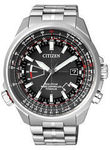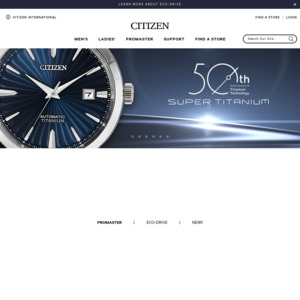Citizen Mens Titanium Eco-Drive Radio Controlled Watch - CB0140-58E
Citizen Mens Titanium Eco-Drive Radio Controlled Watch - CB0140-58E $324 Delivered @Citizen Au
Related Stores
closed Comments

A watch is just jewelry, if you want "accurate" time, use your phone.

Did you set the location to Sydney, and turn the daylight saving time function off? Got one of these a few days ago and it's been fine.

Does it indicate it is receiving signal?
(Watch will work without signal to update time. But if set to incorrect time, will reset to correct time.)
Is signal from Sydney?The clock has no ability to choose location, just picks up strongest signal (previously from Japan) & resets time. It has setting for daylight saving.
Antenna wire was snipped to make into normal clock without radio control.
If there now is a transmitter in Sydney, that would be great!
I just reconnected antenna & didn't set time. Time reset overnight in the past - so will wait & see what time it selects ;-)
Is signal from Sydney?
He said set the location to Sydney.
If there now is a transmitter in Sydney, that would be great!
We can't even build a broadband network that is better then Kenya so do you think we would ever have an atomic clock to make life easy? Brisbane will get another bridge before that happens (ie never).

FTFM: The auto update takes place at 2 am each day, and if unsuccessful it will try again at 3 am and 4 am. You can check if it can get the signal by pressing the bottom right button and the second hand will move to the OK position on the radio indicator on the bottom left of the face. I've not had any luck with manual reception.
The nearest station is in Japan. The instructions indicate the antenna is in the 9 o'clock position of the watch, and suggests pointing that at the nearest station (i.e. north).
I didn't pick up in your comment that you had a clock as opposed to the watch being discussed here, so you may be out of luck.

@Maverick-au:
There is no transmitter in Australia. Reception as I have found is very poor. That's why I am warning about it.But setting the offset on the watch should reset to local time, if signal is received overnight.
So a strange feature to promote here & in many other countries, as may not reliably work as it does in Japan.

@Infidel:
The signal is in Japan time, so the watch needs to know its own location so that it can apply the correct offset to the Japan time.
With GPS timing so readily and cheaply available, why would you? We run time-critical processes at work and it's GPS sync all the way.

Suspect that is [@Infidel]'s issue - he has a radio-enabled clock which is not able to have its location altered, by the sound of it.

@The Vat:
Yes - only can adjust daylight savings, no offset.
Disconnecting the antenna solved problem of infrequent but confusing time change. Runs accurately enough without updates. Offset on watch solves that issue, if signal is available.But interestingly it can occasionally pick up signal in Australia! Surprised me. But would be almost useless as move further from transmitter.
Clock was brought back from Japan. Was only designed to be used in 1 time zone - Japan. Most people don't travel with clocks, even a small one like mine, so adjustment was not seen as necessary. But used in Japan, this older technology saves adjusting so many clocks.

With GPS timing so readily and cheaply available, why would you? We run time-critical processes at work and it's GPS sync all the way.
Because fitting a GPS to devices like clock radios is not cost effective, GPS does not work well in houses and buildings, it's not size effective in a watch and GPS is subject to the control of a foreign government.
An atomic clock would make sense in Australia and it would mean no longer having to set clock radios and watches which would lead to substantial time savings for the nation not to mention time accuracy. The time could be used by clock radios, watches, power meters, gas meters and any other devices that need reasonably accurate time.
Given this country can't get even basic infrastructure right it's no wonder we are left behind.

There is no transmitter in Australia.
I'm well aware of that fact and didn't say that it was.
So a strange feature to promote here & in many other countries, as may not reliably work as it does in Japan.
Most of the developed world has access to it including Europe, Japan and the US.

@Maverick-au:
There are atomic watches available (that use GPS rather than a radio signal )But very expensive

Not size effective in a watch? I have a 37 gram Garmin Vivoactive that has GPS. It's been portable in sports watches since the early 2000's - in 2006 I ran a top 50 finish at the Gold Coast Marathon with a GPS enabled wrist watch.
GPS is indeed in the control of a foreign government. You also have Glonass or, eventually, Galileo.
Radios - accurate time already available over digital radio for the 10 of us left who don't use mobile phones for alarm clocks. Power and gas meters - not hugely important and only for billing purposes, and where it is it's usually paired with a 3 or 4G SIM card where time is available via the network signal.
It's not worth the tax spend.

Not size effective in a watch? I have a 37 gram Garmin Vivoactive that has GPS. It's been portable in sports watches since the early 2000's - in 2006 I ran a top 50 finish at the Gold Coast Marathon with a GPS enabled wrist watch.
How big does the battery need to be to power the GPS as opposed to receiving a radio signal a few times a day? I have to charge my smartwatch daily, watches that receive time updates via radio run on battery power for years. Find me a watch with GPS that can do that without a backpack battery pack.
Radios - accurate time already available over digital radio for the 10 of us left who don't use mobile phones for alarm clocks.
Plenty still using clock radios and I see no reason to use my phone for that purpose.
Power and gas meters - not hugely important and only for billing purposes, and where it is it's usually paired with a 3 or 4G SIM card where time is available via the network signal.
Which costs us all in additional bill costs because the power, water and gas companies just pass on the costs. A more cost effective method would be a mesh network with time updates via radio with fallback to the mesh network.
It's not worth the tax spend.
Given the huge savings we could make in so many areas I would suggest it would be money well spent but our country is known for inefficiency and money wastage so why stop now?

From Citizen Australia
Please note: The radio-wave technology is not available within Australia or New Zealand, so unfortunately radio-controlled watches in these countries cannot automatically detect the correct time. However, in some instances, these watches can pick up on radio waves from towers overseas that may not account for daylight savings time in Australia and New Zealand.
Yep, that's pretty widely known. General user experience is that Brisbane reception is fairly reliable, Sydney less so, and Melbourne less so again. As every, YMMV.

@The Vat:
News to me.
Clock rarely does overnight updates - setting time 1 hour back. Must wake up for the time change - maybe 2am tonight ;-)Just brought up issues using this technology, as is a feature of this watch - which may not be a reliable feature in Australia. Not that it would matter if only updated infrequently if watch is reasonably accurate.
But a strange feature to promote here if can't be reliably used.
@Infidel:
Clock reset time & date in the last hour. Time is set to Japan time. So radio feature on watch should work well a lot of time in Brisbane. Maybe more of issue further from Japan. But probably depends on weather etc.
Never seen it receive signal so well before or adjust before early hours of morning.
@Infidel:
Weather also affects it. I think I read somewhere cloudy overcast skies is the best, and at night time due to interference from the sun.

Who buys dumb watches these days?

Smart people

Nokia 3310 user?

People who love watches. Smart watches appeal to some and regular watches to others.

I cannot seem to find it listed anywhere, I assume it's quartz?

Its eco drive. So its solar. Recharges a battery via solar.

Quartz is a mechanism for keeping time, the alternative is mechanical gears.

In that case this might answer you question.
https://www.watchco.com/watch-guide/quartz-automatic/
Not every quartz watch is battery powered. Citizen employs what they call "Eco-drive technology" which is a fancy way of saying solar powered. Citizen Eco-drive watches charge themselves even with ordinary indoor light and can run up to several months without additional exposure to light when fully charged.

@xoom:
Yes, every quartz watch is battery powered. It's just that the battery in some like the eco-drives is a capacitor that is charged by a solar cell, or in others by the movement of the wearer. The battery or capacitor emits a voltage that causes the quartz crystal to oscillate a certain number of times per second, and the circuitry in the watch counts the oscillations to determine when a second has elapsed.The alternative is a spring powered mechanical watch, though the spring can store energy by winding it or from an automatic mechanism that is powered by the movement of the wearer.

Here's my experience with my Citizen H820.
I rarely check if it's received a radio signal but occasionally when I do check (once a month or two) sometimes it'll say 'OK' meaning it's picked up a signal overnight and set the time. I'm in Brisbane and it's never set the time to Tokyo or 1 hour off. This is because I've set my watch to Sydney location so it knows to put it 'forward' 1 hour. I also manually turn off DST.
I just checked while writing this and it says it was set last night.
Sometimes when I'm bored I set the time manually using a javascript or iPhone app and a diy antenna.
http://www.jrcomputing.com.au/Set_Watch/Set_Watch_Auto.html
https://itunes.apple.com/au/app/jjy-simulator/id431054911?mt…When I use the iPhone app, I have to remember to set the time on my iphone to Tokyo or the time will be 1 hour off.
It's a nice gimmick and if it's actually setting the time automatically via radio every 2 months I'm happy. It's pretty accurate (checked against to my iPhone) so it's not going to be off by much before it gets set.
What I like about the watch is the perpetual calendar. At work I have to climb on a chair to get to the clock in my office to set the date. I don't have to think about it for my watch. I also like the eco-drive. Never have to worry about the battery.

My original comment was to alert people that the radio controlled feature in the title may not work or only work occasionally - depending on their location.
It's more gimmick than feature unless you can regularly receive the signal. But updating time on a good watch should be rarely required, unless changing time zones when travelling or setting daylight saving.
Glad I made the comment as I've learnt a lot from others here - thanks.
Yes, signal can be unpredictable even in Brisbane (very good last night as updated clock twice - clear sky, low humidity, etc, but manual update now can't detect signal). Would be more of an issue further South.
Tokyo time is only an issue on my $10 alarm clock with no time offset. In the watch the issue is eliminated with the offset when set to local time location.
Was wondering how the javascript time setting is - so thanks for the feedback. I had commented about it above. Did you try using just earphones (handy when travelling)? The coil is easy to build, so may try it one day. For the moment I will disconnect the antenna in the clock again & update time manually. Better than being 1 hour late ;-)
My interest in this deal was simply the radio controlled technology.
I have almost never worn a watch in many years, after writing an academic paper on watch watching behavior in the anxious person. I became far too conscious of my own watch behaviour & now enjoy a more relaxed life without being reminded of the time.

Interesting comment on the watch thing - I have a Garmin Vivoactive (the original non-HR model, and broken down old marathoner) which I tend to wear at work because of the smartwatch features, sparkie and the rubberised band's not conductive, we're quite time dependent, and they weigh nothing (37 gm) so it has little physical presence.
My various other watches - I tend to wear them more as 'accessories'. I'm fairly techie so the idea of the radio-atomic clock thing appealed (I have a pile of GPS enable running watches so I'm not short of accurate time pieces) but I liked the design, plus the solar recharging (I have a Pulsar watch I bought cheap which I shared here a while back) and the perpetual calender (I have a 6 yo Seiko my wife bought me with a similar feature(. Thinking on it, when it turned up in the mail I found the tactile aspects of the watch most interesting, the lightness combined with the precision feel of the finish - it's a quite lovely mechanical thing.
I am quite time driven, but it's been interesting to reflect on these behaviours.

Watches can be divinely beautiful objects & technological marvels. I've spent some time at the Royal Observatory in Greenwich - home to timekeeping & the chronometer.
My paper dealt with the simple time keeping function & how people may observe the time (due to their anxiety) more while running late, causing more anxiety. It was looking at basic behaviour modification to lower anxiety.
Travelling on a "hard-seat" train (cheapest class) years ago in Western China, I realised I was the only one out of about 60 locals wearing a watch. People would come up and wrench my wrist to view the time.
My rare requirement for a watch is simply to know the time - my life rarely requires me to be 'time-driven'.
I last wore a watch in Tokyo a few months back because my phone had died at the remote beach house I was renting. Realised I needed a watch so I wouldn't miss my flight & found one someone had discarded. That cheap watch showed the time, but was at the other end of the market from your watches ;-)So watches mean different things to different people. Enjoy yours :-)






Um, radio controlled = In certain parts of the world radio waves automatically update time and date function (Japan & Europe when I last checked)
My Citizen radio controlled clock in Brisbane kept setting to time in Japan at night⏰ Very confusing so needed to be rewired to disable final reception.